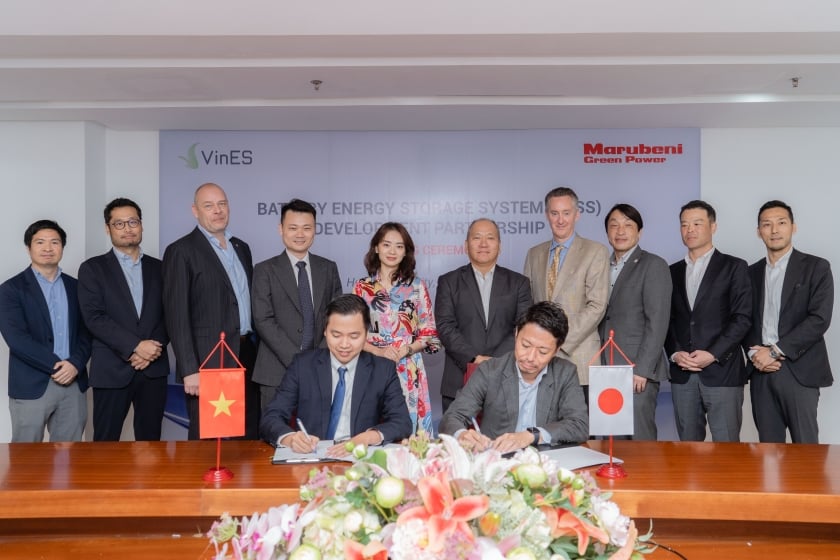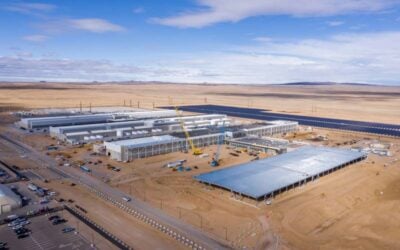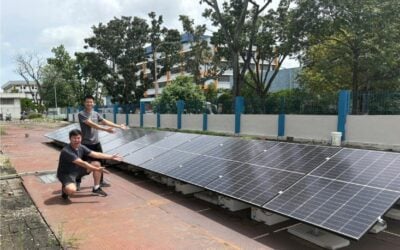
Japan’s Marubeni Corporation is working with Vietnamese battery and energy-as-a-service provider VinES to develop energy storage facilities in the Southeast Asian country.
Announced just a few days after the Vietnamese government approved a Master Plan for the development of the electricity sector to 2030, Marubeni and VinES have signed a Memorandum of Understanding (MoU) for their partnership.
Enjoy 12 months of exclusive analysis
- Regular insight and analysis of the industry’s biggest developments
- In-depth interviews with the industry’s leading figures
- Annual digital subscription to the PV Tech Power journal
- Discounts on Solar Media’s portfolio of events, in-person and virtual
Marubeni will begin its side of the cooperative work with a feasibility study of battery energy storage system (BESS) installations which could be installed at commercial and industrial (C&I) locations of VinGroup, VinES’ parent company – and Vietnam’s largest conglomerate.
This would aid VinGroup’s decarbonisation strategy, with batteries deployed onsite used to help manage the grid and perform demand response functions that reduce the facilities’ draw of electricity from the grid.
The BESS units would do this in combination with onsite solar PV arrays which Marubeni – already active in renewable energy markets around the world – would also deliver, under a no-money-down business model. As well as in Vietnam, Marubeni would look to roll this no upfront cost offering in territories including Mexico, Thailand, the Philippines and Japan.
Marubeni recently also signed a strategic partnership agreement with state-owned power utility Vietnam Electricity Group (EVN) for collaboration in decarbonisation activities.
Vietnam’s VinES meanwhile is aiming to become an early leader in the country’s energy storage market. In November last year, it broke ground on a new lithium iron phosphate (LFP) battery cell factory in the Vung Anh Economic Zone, which is being built together with Chinese battery manufacturer Gotion Hi-Tech.
The US$275 million factory will produce cells for VinES BESS products, as well as for electric vehicles (EVs) made by VinFast, another VinGroup subsidiary. VinES also recently signed an agreement to explore battery recycling opportunities with North American specialist Li-Cycle.
Master Plan targets decarbonisation, PV self-consumption, energy exports
The business collaboration between Marubeni and VinES appears to be aligned with some of the primary goals of Vietnam’s new Master Plan VIII for the development of the power sector. The plan outlines main and specific objectives to 2030, with a longer-term ‘vision’ for how the sector should look by 2050.
As reported by our colleagues over at PV Tech last week as official approval by the government was announced, that includes a goal to get 50% of office buildings and 50% of residential dwellings to utilise distributed rooftop PV for self-consumption of generated power, without export to the national grid.
This will likely involve the widespread use of batteries. The renewable energy sector in Vietnam has had a remarkable past few years, including 2020 when around 9GW of commercial PV was installed around the country, driven by a feed-in tariff (FiT).
However, this rapid growth of solar, unaccompanied by a commensurate investment in energy storage or other demand management technologies or transmission networks, led many to raise concerns that the grid would not be able to handle the integration of that variable renewable generation (VRG).
In a 2022 study commissioned by asset management group Dragon Capital, consultancy AqualisBraemar LOC Group (ABL Group) identified behind-the-meter batteries as a potential means to solve that challenge. There was also a recent US$35 million commitment by the Asian Development Bank to help accelerate development of the Vietnamese BESS market, in that case primarily to enable better access to electricity for rural and low-income communities.
At grid-scale, US engineering company Honeywell was recently selected for the first large-scale BESS project in Vietnam, which will be installed at a solar PV plant and funded with assistance from the US Consulate General.
Other aspects of the Master Plan VIII include a target of becoming a bigger exporter of energy to other countries, aiming for an export capacity of between 5,000MW and 10,000MW by the end of this decade, investment into new power sources and transmission grids which could total more than half a trillion US Dollars and regular reviews of the power sector’s status, to be conducted by utility EVN.
Energy-Storage.news’ publisher Solar Media will host the 1st Energy Storage Summit Asia, 11-12 July 2023 in Singapore. The event will help give clarity on this nascent, yet quickly growing market, bringing together a community of credible independent generators, policymakers, banks, funds, off-takers and technology providers. For more information, go to the website.






